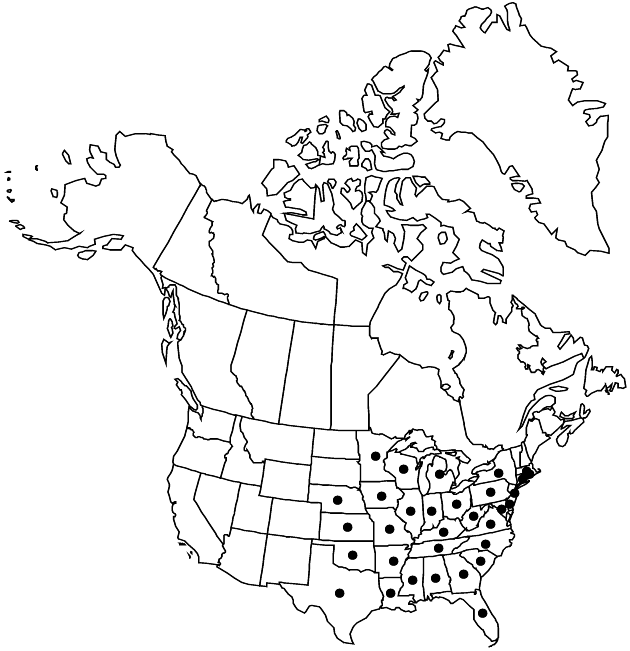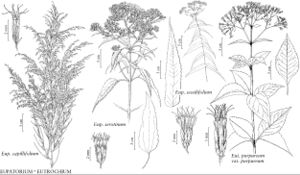Difference between revisions of "Eupatorium serotinum"
Fl. Bor.-Amer. 2: 100. 1803.
FNA>Volume Importer |
FNA>Volume Importer |
||
| Line 24: | Line 24: | ||
|elevation=10–400+ m | |elevation=10–400+ m | ||
|distribution=Ala.;Ark.;Conn.;Del.;Fla.;Ga.;Ill.;Ind.;Iowa;Kans.;Ky.;La.;Md.;Mass.;Mich.;Minn.;Miss.;Mo.;Nebr.;N.J.;N.Y.;N.C.;Ohio;Okla.;Pa.;R.I.;S.C.;Tenn.;Tex.;Va.;W.Va.;Wis. | |distribution=Ala.;Ark.;Conn.;Del.;Fla.;Ga.;Ill.;Ind.;Iowa;Kans.;Ky.;La.;Md.;Mass.;Mich.;Minn.;Miss.;Mo.;Nebr.;N.J.;N.Y.;N.C.;Ohio;Okla.;Pa.;R.I.;S.C.;Tenn.;Tex.;Va.;W.Va.;Wis. | ||
| − | |discussion=<p>Eupatorium serotinum has a wide distribution and is often abundant where it occurs. It includes only sexual, diploid populations. It is known to hybridize with E. perfoliatum. An introduction of E. serotinum in southeastern Ontario apparently is local and may not have persisted.</p> | + | |discussion=<p><i>Eupatorium serotinum</i> has a wide distribution and is often abundant where it occurs. It includes only sexual, diploid populations. It is known to hybridize with <i>E. perfoliatum</i>. An introduction of <i>E. serotinum</i> in southeastern Ontario apparently is local and may not have persisted.</p> |
|tables= | |tables= | ||
|references= | |references= | ||
| Line 48: | Line 48: | ||
|publication year=1803 | |publication year=1803 | ||
|special status= | |special status= | ||
| − | |source xml=https://jpend@bitbucket.org/aafc-mbb/fna-data-curation.git/src/ | + | |source xml=https://jpend@bitbucket.org/aafc-mbb/fna-data-curation.git/src/8f726806613d60c220dc4493de13607dd3150896/coarse_grained_fna_xml/V19-20-21/V21_1188.xml |
|tribe=Asteraceae tribe Eupatorieae | |tribe=Asteraceae tribe Eupatorieae | ||
|genus=Eupatorium | |genus=Eupatorium | ||
Revision as of 15:30, 18 September 2019
Perennials, 50–150+ cm. Stems (from short caudices) single, sparsely to densely branched distally, pubescent throughout (sometimes reddish to purplish). Leaves opposite; petiolate (petioles 10–25 mm); blades ± 3-nerved, lanceolate, 20–90+ × 5–40 mm, bases rounded to slightly oblique, margins entire or serrate, apices acute, faces puberulent, gland-dotted. Heads in corymbiform arrays. Phyllaries 8–12 in 1–2 series, elliptic to oblong, 1–3 × 0.5–1 mm, apices slightly rounded to acute, abaxial faces puberulent, gland-dotted. Florets 9–15; corollas 2.5–3 mm. Cypselae 1–1.5 mm; pappi of 20–30 bristles 2–2.5 mm. 2n = 20.
Phenology: Flowering Aug–Oct.
Habitat: Moist or dry, open sites, roadsides
Elevation: 10–400+ m
Distribution

Ala., Ark., Conn., Del., Fla., Ga., Ill., Ind., Iowa, Kans., Ky., La., Md., Mass., Mich., Minn., Miss., Mo., Nebr., N.J., N.Y., N.C., Ohio, Okla., Pa., R.I., S.C., Tenn., Tex., Va., W.Va., Wis.
Discussion
Eupatorium serotinum has a wide distribution and is often abundant where it occurs. It includes only sexual, diploid populations. It is known to hybridize with E. perfoliatum. An introduction of E. serotinum in southeastern Ontario apparently is local and may not have persisted.
Selected References
None.
